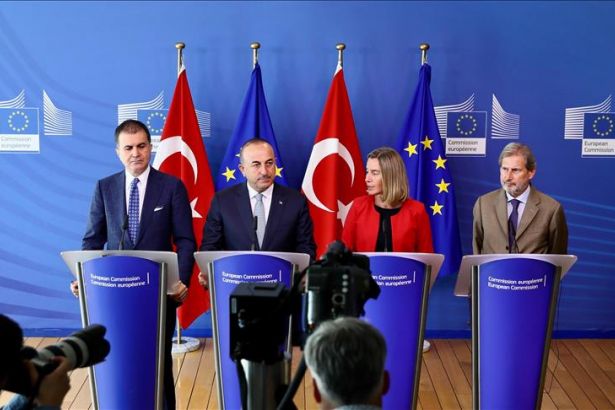Turkey still EU candidate despite row: Mogherini

Earlier on July 25, Brussels hosted a meeting between European enlargement commissioner Johannes Hahn, EU foreign policy chief Federica Mogherini, Turkish Foreign Minister Mevlüt Çavuşoğlu and EU Minister Ömer Çelik. One Turkish minister describing membership discussions as "backbone" of Ankara-EU relations.
The meeting in Brussels was formally about Turkey's long-stalled bid for EU membership, the fight against terrorism and energy and trade ties. Çavuşoğlu said they discussed crises in Qatar, Syria, Libya, and Ukraine and they have no differences in views on these issues.
Turkey’s EU minister Ömer Çelik, said discussions were constructive.
"If we put aside the accession negotiations, there is no way to speak of developing relations in energy, trade or fighting terrorism. Turkey is not only a neighbour country but also a candidate country," Ömer Çelik said. "It's clear that we have differences, that we have disagreements, but dialogue, discussions and (the) search for settlements ... will of course continue," he added.
Çelik called accession negotiations "the backbone" of EU-Turkey relations and said the best way to discuss differences would be to open accession chapters. He said the chapters that cover the judiciary, fundamental rights and security should be opened.
'TURKEY STILL EU CANDIDATE'
"Clearly Turkey is and stays a candidate country," EU foreign policy chief Federica Mogherini told the news conference, after meeting Turkish ministers. Mogherini, however, warned that "concrete steps" were needed before there could be any progress on Ankara's long-stalled candidacy. "Cooperation and dialogue need to be sustained in concrete, positive steps in areas of rule of law and fundamental freedoms," she said.
Mogherini stressed the importance of their "frank and constructive" talks to resolving differences but said it would "be difficult at the moment to open new chapters" in the accession process.
"We have raised what is very important for us, which is not so much to hear during our dialogue, but to see concrete steps in the field of rule of law, human rights, democracy, media freedom," Mogherini said.
After the meeting in Brussels, European enlargement commissioner Johannes Hahn expressed "very strong concern" about the detentions, while Turkish Foreign Minister Mevlüt Çavuşoglu defended them as a necessary part of his country's "fight against extremism".
Çavuşoglu said repeatedly that Turkey stood by agreements it signed while the coup crackdown was fully justified by the need to combat terrorism, a goal the European Union shared. "We have not seen enough support from the EU" over the coup, he said, insisting: "Nobody can say there is no law in Turkey." The minister said that Turkey would continue the persecution of journalists and politicians linked to US-based Islamic cleric Fethullah Gulen, who is accused by Ankara of having masterminded last year’s attempted coup.
VISA FREE TRAVEL
Ankara needs to implement five remaining requirements within the visa liberalisation road map for the European Union before visa requirements for Turkish citizens can be lifted, Johannes Hahn said.
"We have also discussed visa liberalisation. Our message on this is clear: we will deliver our part of the deal as soon as Turkey meets all the remaining benchmarks. We stand ready to support Turkey in this last but difficult bit and we are talking about five remaining benchmarks out of 72," Hahn said.
The number of migrants who illegally cross the maritime border between Turkey and Greece decreased by 99 percent due to the Turkish-EU deal on undocumented migrants, Çavuşoğlu said.
In March 2016, the European Union and Turkey agreed that Syrian refugees arriving in Greece would be returned to Turkey if their claim for asylum is rejected, while Syrian asylum seekers in Turkey would be resettled in Europe on a one-for-one basis. The agreement was supposed to address the overwhelming influx of migrants and refugees to Europe.




